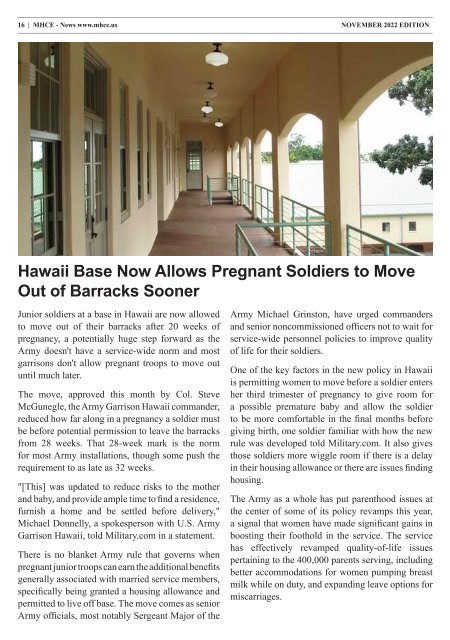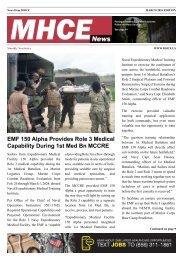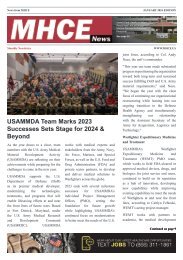November 2022 — MHCE Newsletter
Create successful ePaper yourself
Turn your PDF publications into a flip-book with our unique Google optimized e-Paper software.
16 | <strong>MHCE</strong> - News www.mhce.us NOVEMBER <strong>2022</strong> EDITION<br />
Hawaii Base Now Allows Pregnant Soldiers to Move<br />
Out of Barracks Sooner<br />
Junior soldiers at a base in Hawaii are now allowed<br />
to move out of their barracks after 20 weeks of<br />
pregnancy, a potentially huge step forward as the<br />
Army doesn't have a service-wide norm and most<br />
garrisons don't allow pregnant troops to move out<br />
until much later.<br />
The move, approved this month by Col. Steve<br />
McGunegle, the Army Garrison Hawaii commander,<br />
reduced how far along in a pregnancy a soldier must<br />
be before potential permission to leave the barracks<br />
from 28 weeks. That 28-week mark is the norm<br />
for most Army installations, though some push the<br />
requirement to as late as 32 weeks.<br />
"[This] was updated to reduce risks to the mother<br />
and baby, and provide ample time to find a residence,<br />
furnish a home and be settled before delivery,"<br />
Michael Donnelly, a spokesperson with U.S. Army<br />
Garrison Hawaii, told Military.com in a statement.<br />
There is no blanket Army rule that governs when<br />
pregnant junior troops can earn the additional benefits<br />
generally associated with married service members,<br />
specifically being granted a housing allowance and<br />
permitted to live off base. The move comes as senior<br />
Army officials, most notably Sergeant Major of the<br />
Army Michael Grinston, have urged commanders<br />
and senior noncommissioned officers not to wait for<br />
service-wide personnel policies to improve quality<br />
of life for their soldiers.<br />
One of the key factors in the new policy in Hawaii<br />
is permitting women to move before a soldier enters<br />
her third trimester of pregnancy to give room for<br />
a possible premature baby and allow the soldier<br />
to be more comfortable in the final months before<br />
giving birth, one soldier familiar with how the new<br />
rule was developed told Military.com. It also gives<br />
those soldiers more wiggle room if there is a delay<br />
in their housing allowance or there are issues finding<br />
housing.<br />
The Army as a whole has put parenthood issues at<br />
the center of some of its policy revamps this year,<br />
a signal that women have made significant gains in<br />
boosting their foothold in the service. The service<br />
has effectively revamped quality-of-life issues<br />
pertaining to the 400,000 parents serving, including<br />
better accommodations for women pumping breast<br />
milk while on duty, and expanding leave options for<br />
miscarriages.


















